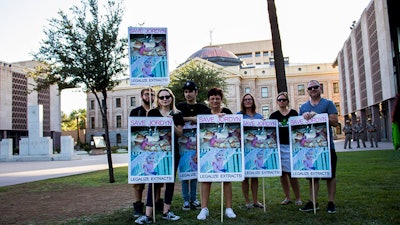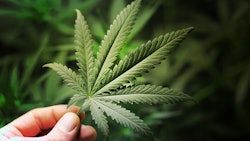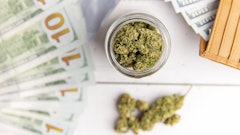
Dozens of medical marijuana patients and their families congregated outside the Arizona State Capitol in downtown Phoenix July 3 to denounce a recent Arizona Court of Appeals ruling that the state’s medical marijuana law does not permit the use of cannabis extract products, like oil cartridges. The court refers to those products collectively as “hashish” or “the resin extracted from the marijuana plant,” and insists that the state law “in no way immunizes the possession or use of hashish.”
Now, a growing segment of the medical marijuana industry in Arizona is thrown into uncertainty. (Read the full court ruling below.)
Medical marijuana patient Deb Estrada told Fox 10 at the rally that she “can’t believe that people are not able to take their medication in their chosen delivery method.”
The latest Arizona v. Jones ruling stems from the 2013 arrest of Rodney Jones in Prescott, Ariz. After police found Jones in possession of 1.4 grams of “hashish,” he served 366 days in jail. Jones was a registered medical marijuana patient in the state.

“There’s a lot of concern and confusion going [on] across the industry,” he says. “But at the end of the day, this issue is just one facet of all the problems we have had in the medical marijuana program.” He cited past legal conflicts over the state’s patient-to-patient sales and at-home cultivation policies.
As Arizona v. Jones continues to advance through the state courts (an appeal to the Arizona Supreme Court is imminent), Wisniewski says a critical problem with the Arizona Medical Marijuana Act (AMMA) is in the vague language used to define “marijuana” and its chemical and botanical constituents. As the appeals court wrote: “AMMA is silent as to hashish. … We cannot speculate that the voters, in allowing the limited use of marijuana to ameliorate patients’ suffering and distress, would, if they also intended to similarly immunize the use of hashish, have allowed the same quantity of narcotics as of the relatively benign flowers of the marijuana plant.”
For now, indeed, possession of hashish—cannabis extract products—is a class-4 felony under Arizona state law.
To clarify the matter, Safer Arizona has been gathering signatures for a comprehensive adult-use legalization ballot measure. Those signatures were due July 5, and Wisniewski says his group came up with only half of the required signatures needed to get on the November 2018 ballot. (The organization is now looking toward 2020.)
Because an appeal to the Arizona Supreme Court is all but certain, dispensary owners have by and large continued to sell and purchase extract products.
“It’s business as usual for everyone in our organization,” Monarch Wellness operations manager Jennifer Dresbach tells CBT.
"It is our understanding that nothing dramatic or draconian will occur," Kevin DeMenna, a lobbyist for the Arizona Dispensary Association, told Phoenix New Times. "It's a bad development in an otherwise positive environment."
K.I.N.D. Concentrates issued a statement on the ruling, writing: “We received many questions from patients and others as to the meaning of Jones. While we disagree with the reasoning in Jones, as some have interpreted it, please note that we do not sell ‘hashish.’ Any products sold under our brand are medical marijuana and mixtures or preparations thereof, under strict regulations from the Arizona Department of Health Services (ADHS). The AMMA defines usable marijuana to mean ‘the dried flowers of the marijuana plant, and any mixture or preparation thereof.’”
That AMMA definition gives dispensary owners some legal leeway in selling and distributing cannabis extract products. There’s a gray area for dispensary businesses, and a semblance of defense in selling cannabis extract products or “preparations.” But because Arizona v. Jones is a criminal case, the liability is placed firmly on the patient, the person who may be buying, possessing and using a product deemed illegal in a state court. Anyone suspected of using cannabis extract products, like Jones in 2013, could conceivably be targeted and possibly charged.
Laura Bianchi, partner and director of the cannabis department at Rose Law Group, says that the recent ruling is out of sync with previous civil litigation in Arizona and with the trajectory of the state’s medical marijuana industry writ large.
"It's placed a lot of conflict and a lot of difficulty on the industry and on the state and on local law enforcement, because this is a criminal case," Bianchi says. "They sort of picked and took some tiny pieces out of our medical marijuana law and our program and rules and tried to redefine hashish from a criminal code perspective."
The Arizona v. Jones ruling clashes with a civil ruling in Arizona’s largest county, Maricopa County, which includes Phoenix.
In 2013, Jacob and Jennifer Welton sued the state of Arizona over their legal right to give their 5-year-old son, Zander, CBD oil as a medication for his seizure disorder. The lawsuit was filed in the Superior Court of Arizona in Maricopa County, where judges eventually ruled that the AMMA does include extracts under its medical marijuana program. Through the civil litigation, the judges indeed conceded that there’s room for debate around this matter in the law, writing: “A real, justiciable controversy requiring clarity exists here.”
In the Maricopa County court’s opening salvo, the presiding judge points out exactly the sort of debate that has been reignited by the June 2018 appeals court ruling in Arizona v. Jones. “The issue is one of statutory interpretation,” according to the Maricopa County Court. “Does Arizona’s Medical Marijuana Act … allow medical marijuana to be consumed in extract form? As set forth below, the Court concludes it does and that Plaintiffs are entitled to an order that decriminalization of marijuana for medical purposes includes extracts adapted from marijuana.”
Again, however, the question persists.
“This is medicine,” Wisniewski says. “It saves people’s lives. And this ruling is damaging.”
Until litigation continues through an appeal—or until an arrest is made for possession of hashish—the atmosphere in Arizona is fraught.
“One of the cornerstones of why Arizona voters even passed the AMMA was for the purpose of protecting patients,” Bianchi says. “This does the exact opposite. This actually places the greatest amount of risk and liability on our patients. … They didn't really identify or address that as I think they should have. Now, it's created this source of confusion.”
Arizona v. Rodney Jones (Appeal) by sandydocs on Scribd
Photos courtesy of Safer Arizona

























